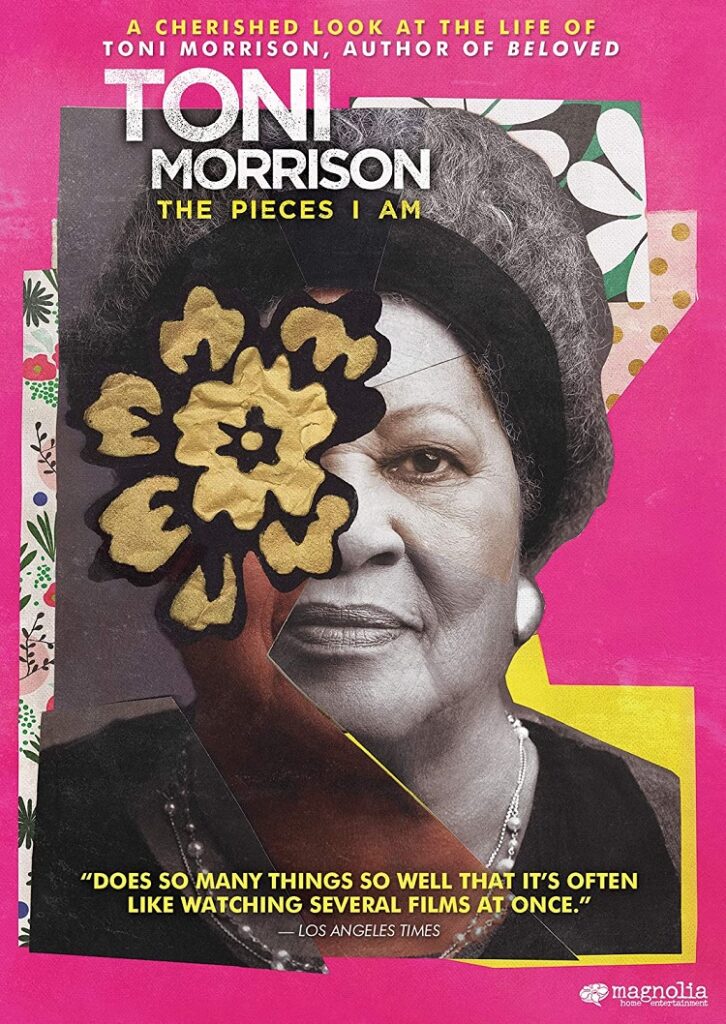
The Pieces I Am, Timothy Greenfield-Sander’s straightforward documentary about the late Nobel and Pulitzer Prize-winning author Toni Morrison, consists (mostly) of Morrison talking directly to the camera as she discusses her work and her life. Other interviewees include Angela Davis, Oprah Winfrey, Fran Lebowitz, screenwriter Russell Banks, and poet Sonia Sanchez. The documentary also shows clips from interviews Morrison did with Charlie Rose, Bill Moyers, and others. There’s footage of the author receiving the Presidential Medal of Freedom in 2012, and other archival clips.
Morrison passed away at the age of 88 in early August, leaving behind a body of work that includes the award-winning novels Beloved and Song of Solomon, nine other novels, plus several children’s and non-fiction books. She taught at Cornell, Princeton, and Rutgers.
Toni Morrison (birth name: Chloe Ardelia Wofford) grew up in a multi-ethnic neighborhood in Lorain, Ohio. When she was two years old, however, the family’s landlord set fire to the house they were living in because they couldn’t pay the rent. Her father laughed at the landlord instead of backing down. Morrison’s father had seen lynchings as a young man in Georgia, and was suspicious of white people. Morrison’s grandfather read the Bible five times – not because he was religious, but because it was illegal for African Americans to read at that time. The act of reading became a declaration of free will.
As a child, Morrison had a love for words. She was the only child in her first grade class who knew how to read. She smiles as she remembers writing words on the sidewalk with her sister until an adult caught them writing a bad one.
She talks about her high school days fondly, and everyone in her working class neighborhood – Poles, Czechs, Irish, Russians, and African-Americans – lived in the community without incident. (Toni, a shortened form of her Catholic baptismal name Anthony, became her nickname.)
Morrison attended all-black Howard University in Washington D.C., where she encountered racial segregation in restaurants and other businesses for the first time. She joined the Howard Players and enjoyed acting in productions of Shakespeare’s plays. Dramatic works, she said, fostered different discussions and an environment that focused on talent rather than semantics.
After a brief marriage, Morrison’s husband left her to return to his native Jamaica in 1964. She answered a help-wanted ad for an editor job at a textbook division of Random House after her divorce. She was soon promoted to fiction editor, and worked full-time while raising her two sons and writing her own books in her spare time.
Morrison fought to get paid as much the white male editors at Random House. When she pointed out that she also had children to support, like they did, she got the raise. During her time at Random house, she edited works by Henry Dumas, Muhammad Ali, Angela Davis, and Boris Bittker’s The Case for Reparations. She became lifelong friends with Davis. She also edited The Black Book, the first mainstream anthology of African-American History.”
Her first novel, The Bluest Eye, was inspired by a conversation with a friend, who said she prayed every night to wake up with blue eyes. At the time of the book’s publication, there were no role models in media for young black women.
Some literary critics weren’t quite sure how to interpret Morrison’s work during the beginning of her career. One critic wrote that Morrison was too good of a writer to focus exclusively on black characters. Morrison’s work replaced the white gaze, a term she used to describe the black experience as told by a white narrator (To Kill a Mockingbird, etc.). Her work brought a powerful, authentic voice to black female characters.
Like any writer, Morrison has a daily routine. She reveals that she writes her initial drafts longhand on lined pads, and prefers to work early in the morning when the sun rises. In a break from the “write what you know” cliché, Morrison advises her creative writing students write about subjects that are a long distance from their lives. She remarks that students create some wonderful work when they are challenged to get out of their comfort zone.
As Morrison speaks throughout The Pieces I Am, her voice is soothing but filled with a quiet passion for life, for knowledge, and for words. This documentary will inspire many viewers to revisit Morrison’s novels, or seek out her other works. The title comes from a passage in Beloved – “The pieces I am, she gather them and give them back to me in all the right order. It’s good, you know, when you got a woman who is a friend of your mind.”